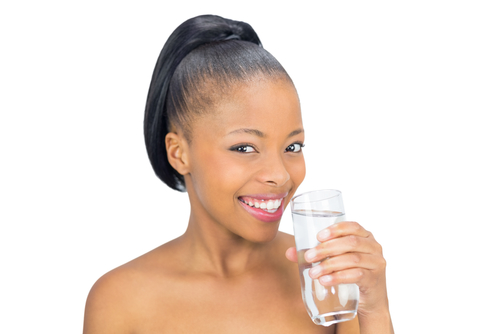5 Hydrating Beverages (Besides Water) With Amazing Health Benefits
Take your weight in kilograms (kg) and multiply it by 25; that…

Take your weight in kilograms (kg) and multiply it by 25; that is the minimum amount of fluid in millilitres (mL) you should aim to drink in a day.
Proper hydration is essential for good health as fluids control body temperature, heart rate, blood pressure, metabolism and help the kidneys effectively remove waste through urine. Severe dehydration contributes to ill health including death.
If you are one of the many people who do not like the taste of water, you can still get hydrated by including foods like watermelon and soup which have a high water content. In addition, non-alcoholic, decaffeinated, non-sugary beverages can be just as refreshing as water. Here are a few of our favourite beverages which not only hydrate but exude multiple health benefits.

1. Zobo. For years you have enjoyed Zobo drink to quench your thirst but did you know that Nigeria’s beloved drink is actually a heart-healthy choice? Numerous studies cite Zobo to be as effective as some blood pressure medications. It is also believed to be effective in reducing LDL (bad) cholesterol while increasing HDL (good) cholesterol.
In order to reap these benefits, individuals must drink at least three cups of Zobo a day. Watch the sugar though, it adds calories and diminishes some of the nutritional benefits. Rather, rev up the nutrition by sweetening the Zobo with fruits or drink it without a sweetener.
READ: Zobo Drink For Heart Health

2. Coconut Water. Drill a hole in a coconut, add a straw and take a sip. Coconut water is receiving accolades in both health and fitness circles. A study published in the American Journal of Emergency Medicine concluded that coconut water contains more potassium than a banana and enough “natural” electrolytes for it could be used as a replacement for IV fluids in emergency situations. It is no wonder, it is nicknamed “Nature’s Sports Drink.” It replenishes electrolytes lost in exercise and physical activity.

3. Bitter Leaf Juice. It may be from a lowly plant but bitter leaf boasts one of the best medicinal properties of any plant in Nigeria. It is an effective treatment for stomach pain, insomnia, toothache, fatigue, cough, and bleeding and has been implicated in the fight against diabetes and high blood pressure. From a nutrition standpoint, the bitter leaf is high in protein, vitamins, iron, phosphorus, potassium, folic acid, vitamin C, copper and zinc making it a great addition to the diets of people who may not be able to get enough nutrients from food. Don’t like Bitter Leaf Juice? Try this Bitter Leaf Smoothie from our Radiant Health kitchen files.

4. Chocolate Milk. There is a reason why babies go “gaga” over milk. A study published in the International Journal of Sports Nutrition and Exercise Metabolism rated milk as one of the best post-exercise recovery drinks for endurance athletes. But not just any kind of milk. Chocolate milk was especially recognized for its carbohydrate and protein content which help replenish the bodies depleted stores. In addition, milk has the added bonus of calcium and phosphorus for bone health.
READ: The Health Benefits of Chocolate

5. Infused Water. We cannot discuss hydration and not talk about nature’s most perfect beverage. Since the beginning of time, water has been used to alleviate thirst, nourish bodies and promote growth. Unfortunately, it has become one of the most under-appreciated beverages with people opting for high-calorie drinks such as soda and juice. If you do not like plain water, try enhancing the flavour by adding slices of citrus, strawberries, cucumber or a myriad of herbs and spices like mint, basil, coriander, cinnamon, ginger or vanilla. The result is sure to be a deliciously refreshing beverage.
Use the colour of your urine as a measure of adequate fluid intakes. The goal is to have pale coloured or colourless urine. Take caution to avoid drinking too much fluid. It can cause a relatively rare (in the general population) yet fatal medical condition known as hyponatremia – too little sodium in the body.
In case you are wondering, while caffeine may cause you to go to the restroom, it does not appear to cause dehydration. On the other hand, alcohol is increases risk of dehydration. As blood alcohol levels increase, the body responds by releasing water in the form of urine. Unless that fluid is replaced with a non-alcoholic beverage, dehydration is sure to follow. Consequently, after an evening of celebrating with a little alcohol, stay hydrated by drinking several glasses of water.
What’s your favorite healthy beverage?
Here’s to your health!


